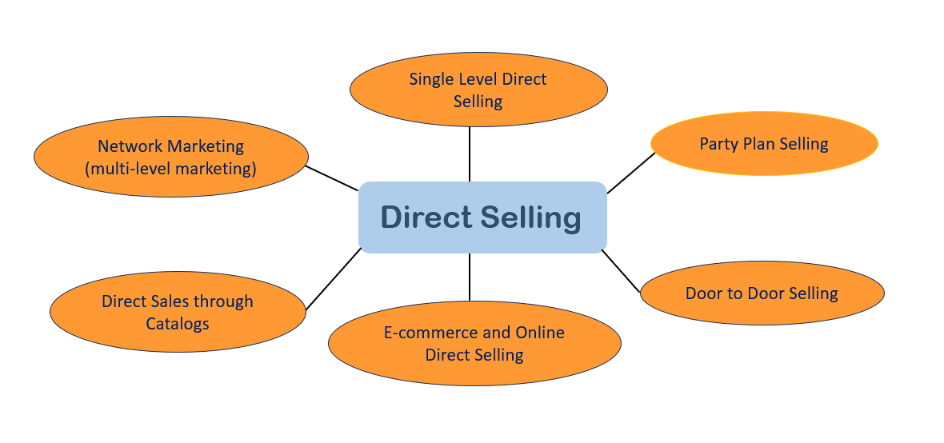Direct selling has been an integral part of India’s business landscape for several decades. This industry involves selling products or services directly to consumers, often through independent representatives, bypassing the traditional retail environment.
updated on 16 Sep 2024, 5:55 PM IST

Network marketing; source: Pexels
A report published in 2024 revealed that the direct selling industry in India is projected to expand at a compound annual growth rate (CAGR) of 4.8% between 2025 and 2030.
The Indian government has recognized the potential of this industry as a major source of self-employment and income generation, contributing to the economic upliftment of many individuals.
This comprehensive article will explore the future of direct selling in India, shedding light on key factors driving its growth and transformation.
Understanding Direct Selling: A Quick Overview
Direct selling is a form of marketing where products or services are sold directly to consumers, usually through personal interactions rather than in retail settings.
Representatives, who often work independently or as part of a network, engage customers either through face-to-face interactions, home gatherings, or increasingly through digital platforms.
The key types of direct selling include:
- Network Marketing (MLM): A business model where individuals earn income through their own sales as well as the sales made by their recruited team members.
- Single-Level Direct Sales: In this model, individuals earn commissions solely from their own sales without the multi-tiered recruitment element.
- E-commerce & Online Direct Selling: The rise of digital commerce has expanded the direct selling industry by allowing representatives to sell through online platforms and social media.
- Door-to-Door Selling: This traditional method involves representatives visiting consumers directly at their homes to sell products.
- Party Plan Selling: Representatives host product demonstration events, usually at someone’s home, to engage customers.
- Direct Sales through Catalogs: Representatives share printed or digital catalogs with potential customers, who then place orders.
Each of these models caters to different consumer preferences and business strategies, giving the industry flexibility to evolve with changing times.

Direct selling types
Key Factors Shaping the Future of Direct Selling in India
Economic Growth and Middle-Class Expansion
India’s rapidly growing middle class is becoming increasingly conscious of spending habits and financial stability. Direct selling presents an attractive opportunity for individuals seeking to supplement their income.
As more people embrace entrepreneurial ventures and side gigs, direct selling provides a low-investment avenue with potentially high rewards. This is especially relevant for those seeking financial independence without a traditional job’s constraints.
The rise of the gig economy, where flexibility and autonomy are highly valued, has paved the way for the direct selling industry to flourish.
The younger population, in particular, is gravitating towards alternative income-generating opportunities, and direct selling fits perfectly into this framework.
Digital Transformation and Technological Integration
In recent years, the direct selling industry has undergone a significant digital transformation. The traditional face-to-face approach has evolved, with digital platforms and social media playing a crucial role in modern direct selling strategies.
Representatives can now showcase products, share testimonials, and engage with potential customers through various online channels.
Social media platforms like Instagram, Facebook, and YouTube have enabled representatives to reach wider audiences through authentic storytelling and relationship building.
Direct sellers are no longer limited to a local market; they can now leverage global digital tools to manage their businesses more effectively.
Online platforms also allow for smoother transactions, inventory management, and customer service, enhancing the overall consumer experience.
Regulatory Support and Government Initiative
The Indian government has started to recognize the value of direct selling as a legitimate business model and an important source of self-employment.
Over the past few years, regulatory frameworks have been put in place to protect consumers and direct sellers alike. This includes measures to curb unethical practices and ensure transparency in business operations.
Companies in the direct selling industry are also investing heavily in training, mentorship, and support for their representatives.
This ensures that individuals entering the industry are well-equipped with product knowledge, sales techniques, and ethical business practices.
Such support not only enhances the credibility of the industry but also helps representatives achieve sustainable success.
Product Diversity and Health-Conscious Consumers
Product diversification has become a major driver of the direct selling industry’s growth in India.
With consumers becoming increasingly health-conscious, there has been a surge in demand for wellness products such as nutritional supplements, organic foods, personal care items, and fitness products.
The wellness industry is particularly well-suited to the direct selling model, as it allows for personalized product recommendations and in-depth explanations of product benefits.
Consumers are more likely to purchase health and wellness products when they receive personalized attention from representatives who can offer tailored advice and solutions.
Rising Entrepreneurship and Youth Engagement
As disposable income levels increase, more individuals explore new products and services, and direct selling offers a flexible way to become an entrepreneur.

Whether someone is looking to work part-time or full-time, the direct selling model offers opportunities to build a business without the traditional overheads associated with starting a brick-and-mortar store.
Additionally, the younger generation is more digitally savvy and willing to embrace innovative business models. They are drawn to the potential for independence, income growth, and personal development that direct selling offers.
The ability to operate a business from anywhere, combined with the possibility of substantial earnings, makes direct selling an appealing option for those seeking an alternative to conventional employment.
Increasing Consumer Awareness and Acceptance
In the past, direct selling faced skepticism due to a lack of awareness and misconceptions about the business model.
However, consumer awareness about direct selling has grown significantly in recent years. People are becoming more comfortable with the concept of buying products directly from independent representatives.
This shift in perception is driven by the personalized experience and superior customer service that direct sellers offer.
As consumers become more discerning and knowledgeable, they appreciate the value that comes with purchasing high-quality, often niche products through trusted representatives.
This growing acceptance is boosting the industry’s credibility and encouraging more people to explore direct selling as both consumers and entrepreneurs.
Changing Work Patterns and the Gig Economy
The shift towards remote work, freelancing, and the gig economy is well-aligned with the flexibility offered by direct selling.
With more people seeking flexible work arrangements that allow them to balance personal and professional lives, direct selling is emerging as a viable option.
Representatives can work from home, set their hours, and tailor their business efforts based on personal goals and time availability.
Moreover, the earning potential in direct selling is performance-based, allowing representatives to determine their income by scaling their efforts. This aligns with the growing desire for more control over work-life balance and financial freedom.
Challenges and Opportunities Ahead
While the future of direct selling in India is promising, the industry does face challenges. One of the primary concerns is the prevalence of unethical MLM schemes that have tarnished the image of legitimate direct selling companies.
Both consumers and potential entrepreneurs must differentiate between legal direct selling operations and fraudulent schemes.

However, with increasing regulatory scrutiny and consumer education, the industry is moving towards greater transparency.
Direct selling companies are placing a stronger emphasis on ethical practices, product quality, and long-term customer relationships.
Top 10 Direct Selling Companies in India
Several prominent direct selling companies operate in India, offering a wide range of products across various categories. Some of the top players in the Indian direct selling industry include:
- Amway India: A leader in health, beauty, and home care products.
- Herbalife: Known for nutritional supplements and weight management products.
- Oriflame: A Swedish cosmetics company offering beauty and skincare products.
- Avon: Focuses on beauty, personal care, and home products.
- Modicare: An Indian direct selling company with a diverse product portfolio.
- Tupperware: Specializes in kitchen and home storage solutions.
- Vestige: Offers health supplements, personal care, and home care products.
- QNet: A global direct selling company with a range of lifestyle products.
- Forever Living Products: Known for aloe vera-based health and beauty products.
- Mi Lifestyle: An emerging player in the wellness and lifestyle sector.
Conclusion
The direct selling industry in India is on the cusp of significant growth, driven by economic expansion, digital transformation, regulatory support, and changing consumer preferences.
As more individuals seek flexible income opportunities and entrepreneurial ventures, direct selling offers a promising path forward.
For aspiring entrepreneurs and consumers alike, this industry holds immense potential in the coming years, making it a sector to watch closely.
With the Indian government’s backing and an increasingly tech-savvy population, the future of direct selling in India looks bright, offering opportunities for innovation, entrepreneurship, and financial independence.

